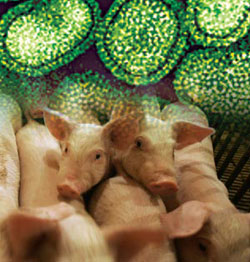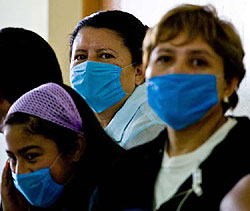|
|
Swine Flu: a health emergency
 The U.S. government has declared swine flu to be a public health
emergency. The U.S. government has declared swine flu to be a public health
emergency.
The World Health Organization has not declared swine flu to be a pandemic.
The WHO wants to learn more about the virus first and see how severe it is and
how deeply it takes root.
To learn more about Swine Flu- causes, symptoms and treatment, read on.
U.S. Human Cases of Swine Flu Infection
(As of April 27, 2009 1:00 PM ET)
|
State
|
# of
laboratory
confirmed cases
|
California
|
7 cases
|
Kansas
|
2 cases
|
New York City
|
28 cases
|
Ohio
|
1 case
|
Texas
|
2 cases
|
TOTAL
COUNT
|
40
cases
|
International Human Cases of Swine Flu Infection
See:
World Health Organization
|
What is swine flu?
 Swine influenza (also swine flu) refers to influenza caused by any virus of
the family Orthomyxoviridae that is endemic to pig populations. Known strains of
swine influenza virus (SIV) are classified as either Influenzavirus C or one of
the subtypes of Influenzavirus A. Swine influenza (also swine flu) refers to influenza caused by any virus of
the family Orthomyxoviridae that is endemic to pig populations. Known strains of
swine influenza virus (SIV) are classified as either Influenzavirus C or one of
the subtypes of Influenzavirus A.
Who are at Risk?
People who work with poultry and swine, especially people with intense
exposures, are at risk of infection from these animals if the animals carry a
strain that is also able to infect humans. SIV can mutate into a form that
allows it to pass from human to human. The strain responsible for the 2009 swine
flu outbreak is believed to have undergone this mutation.
Swine flu doesn't often infect people, and the rare human cases that have
occurred in the past have mainly affected people who had direct contact with
pigs. But the current swine flu outbreak is different. It's caused by a new
swine flu virus that has spread from person to person -- and it's happening
among people who haven't had any contact with pigs.
The new swine flu virus apparently spreads just like regular flu. You could
pick up germs directly from an infected person, or by touching an object they
recently touched, and then touching your eyes, mouth, or nose, delivering their
germs for your own infection. That's why you should make washing your hands a
habit, even when you're not ill. Infected people can start spreading flu germs
up to a day before symptoms start, and for up to seven days after getting sick,
according to the CDC.
 The swine flu virus can become airborne if you cough or sneeze without
covering your nose and mouth, sending germs into the air. The swine flu virus can become airborne if you cough or sneeze without
covering your nose and mouth, sending germs into the air.
Scientists are watching closely to see which way the new swine flu virus is
heading -- but health experts warn that flu viruses are notoriously hard to
predict, as far as how and when they'll change.
Symptoms:
Symptoms of swine flu are like regular flu symptoms and include fever, cough,
sore throat, body aches, headache, chills, and fatigue. Some people have
reported diarrhea and vomiting associated with swine flu. Those symptoms can
also be caused by many other conditions, and that means that you and your doctor
can't know, just based on your symptoms, if you've got swine flu. It takes a lab
test to tell whether it's swine flu or some other condition.
Treatment:
-
If you have flu symptoms, stay home, and when you cough or sneeze, cover your
mouth and nose with a tissue. Afterward, throw the tissue in the trash and wash
your hands. That will help prevent your flu from spreading.
-
If you've got flu symptoms, and you've recently been to a high-risk area like
Mexico, CDC officials recommend that you see your doctor. If you have flu
symptoms but you haven't been in a high-risk area, you can still see a doctor --
that's your call.
-
Keep in mind that your doctor will not be able to determine whether you have
swine flu, but he or she would take a sample from you and send it to a state
health department lab for testing to see if it's swine flu. If your doctor
suspects swine flu, he or she would be able to write you a prescription for
Tamiflu or Relenza. Those drugs may not be required; U.S. swine flu patients
have made a full recovery without it.
-
The new swine flu virus is sensitive to the antiviral drugs Tamiflu and
Relenza. The CDC recommends those drugs to prevent or treat swine flu; the drugs
are most effective when taken within 48 hours of the start of flu symptoms. But
not everyone needs those drugs; many of the first people in the U.S. with
lab-confirmed swine flu recovered without treatment.
Precautions:
Recommendations to prevent infection by the virus consist of the standard
personal precautions against influenza. This includes frequent washing of hands
with soap and water or with alcohol-based hand sanitizers, especially after
being out in-public. People should avoid touching their mouth, nose or eyes with
their hands unless they've washed their hands. If people do cough, they should
either cough into a tis sue and throw it in the garbage immediately, cough into
their elbow, or, if they cough in their hand, they should wash their hands
immediately. sue and throw it in the garbage immediately, cough into
their elbow, or, if they cough in their hand, they should wash their hands
immediately.
The CDC also recommends taking these steps:
-
Wash your hands regularly with soap and water, especially after coughing or
sneezing. Or use an alcohol-based hand cleaner.
-
Avoid close contact with sick people.
-
Avoid touching your mouth, nose, or eyes.
Related Links
|
|
|
|
|









